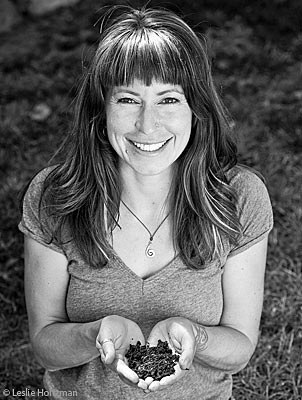Composting Closes the Circle
Reduce, Reuse, Recycle, and Compost!
Trash day comes as a relief to just about every kitchen. But as efficient as routine trash pickup feels, a great deal of it abides by an out-of-sight, out-of-mind philosophy.
Composting is an alternative approach to waste disposal. It doesn’t stand alone, since plastic or chemically treated materials won’t decompose, but people can cultivate a deeper understanding of life’s processes when they consciously sort their waste.
“Composting to me is a way of staying connected with the landscape,” said Elisa Robles, aka The Worm Girl. “I think of it as closing the cycle.” Robles has been composting for almost a decade now. In college, the waste bin she and her roommates used for their lunch scraps fascinated her. She learned how worms speed up the cycle of return to the earth by eating natural waste to produce nitrogen and phosphorous-rich compost that makes for healthy topsoil.

“It became quite common for me to be talking about worms,” she said. And indeed she has become the go-to for worm-bin advice in Santa Barbara. “I love getting people inspired to start their own,” said Robles.
Permaculture practitioners Robles and Whitney Bell rain-checked the composting class they had originally scheduled at Fairview Gardens for Saturday, February 26. They’re waiting on better weather since the class will be outdoors, with plenty of hands-on experience, from 9 a.m. to 5 p.m.
Robles’s worm bins take care of kitchen waste and they fit in a cupboard or the back of your car. Bell takes care of the bigger mess outside with a method called hot composting.
“We fill each other’s gaps,” she said of her and Robles’s approaches to composting. Hot composting requires a big outdoor space to break down landscaping waste. During decomposition, the piles generate heat and they require some tending to, depending on the weather. Rain saturates the compost so it’s best to cover the pile with a tarp. The best way to keep it from drying out in the wind is to water it periodically.
Half of the Composting and Worm Bins Class will be geared toward setting up the small household bins, and the other half will focus on the hot outdoor mounds.
“A lot of people are grossed out but they come and see that it can be really aesthetically pleasing,” said Robles, “and you can be creative with it.”
Bell first got into composting in college after she took a class on food systems. Her first bin was “stinky and slimy,” but through some fine tuning Bell found that composting was a “really empowering and valuable process.” She said, “It’s therapeutic for me to understand where things go after I throw them out.”
Bell also explained the value of composting on a global level. Organic piles sequester carbon from the air, combating global warming on a personal scale. Sustainability efforts are valuable at every level. Santa Barbara has recruited 120 businesses and most of its elementary schools to jump on the composting bandwagon since November 2009.
Santa Barbara’s composting efforts are limited by its political borders, according to environmental specialist Eric Lohela of Santa Barbara City’s Foodscraps Recovery and Composting Program. These borders bar businesses outside the City of Santa Barbara from participating in the program, despite their interest, since there are no countywide plans to implement composting.
Santa Barbara City College removed its yellow compost bins recently. A lack of widespread awareness led to misuse of the City College compost bins, something Santa Barbara’s Composting Program can’t risk. “We have to make sure it’s very clean,” said Lohela, because, in contrast to recyclables, it’s too difficult to sort foodscraps.
The more knowledge about composting circulates in Santa Barbara, the wider its benefits can spread. To sign up for the Composting and Worm Bins Class, call (805) 967-7369 or go to fairviewgardens.org.



